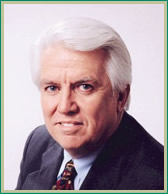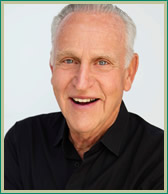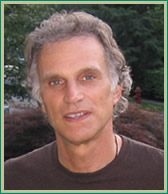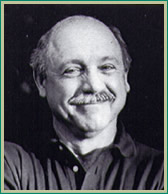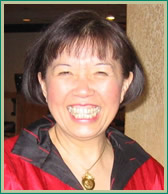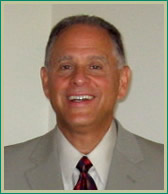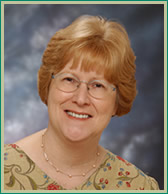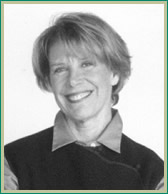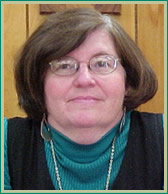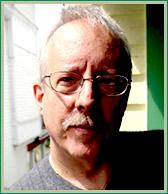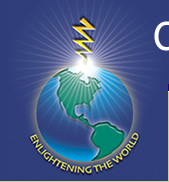

Welcome to the fourth issue of The Lens. In one of the books that Paul Houston and I are writing, we devote a chapter to the Principle of Walk the Talk. As spiritual consciousness grows, like-minded people are producing materials that are aligned with the spiritual principles which we have identified. For a short but effective video about walking your talk go to: www.walkthetalk.com. If it resonates with you, please pass it along. On February 27, Stanley El, host of Rowan University's radio program The American Dream, interviewed me about The Spiritual Dimension of Leadership. To hear the entire interview, pleaase visit Rowan University to listen to a podcast of the program. - Stephen L. Sokolow, Executive Director
Lighting Up the Twilight Reiki and Leadership The Shadow Knows The Metaphor Eleanor Roosevelt's Personal Secretary: A Woman of Resilience and Grace A Humbling Experience Spiritual Consciousness Is Growing! Thinking Good Thoughts The Wisdom of the Oxygen Mask Choosing to Choose Letters to the Editor
Lighting Up the Twilight
My friend Adam has often talked about the “dark night of the soul.” This concept from Jungian psychology describes those moments when we pass through life’s lowest valleys. This dark night usually comes at moments of great crisis, when all about us seems dark and gloomy and we see no way out. If the night is dark enough, it can lead to major trauma; some choose to give up at that point. For others, such dark nights can lead to life-altering transformation. Most of us, happily, don’t have many of those nights. But I think that, far more than we might care to admit, we do experience some “gray twilights” of the soul—those moments when we are off our spiritual game and when we become unplugged from our power source. What I find interesting is how easy it is for that to happen. I like to consider myself a spiritual being. (Why else would I be involved in all this?) Still, however, I realize with some regularity that I have forgotten my lessons and slipped into a state of “unawareness.” This slippage tends to happen when I have allowed myself to become too busy and too stressed—which are exactly the times when a powerful connection with the Infinite is most needed. I forget to pray and to quiet my mind and to focus on my higher self. And slowly but surely I drift into that gray twilight; I can see what is happening, but I am not very focused, not clear—and I feel nighttime approaching. For me, that is the time to yell stop—to jerk myself back to what I know is needed: reflection and reconnection. For me, such recentering can take many forms. Maybe it comes about by reading some inspirational material, or even seeing a movie that moves me to think about the inside and not about the outside. It could be a walk in nature, or it could be something as simple as making certain that I am rested and feeding my body what it needs so it does a better job of housing my soul. Certainly it is, at some point, recognizing the truth that I am not a human being having a spiritual experience, but a spiritual being having a human experience. Like most anyone else, I can get materialistic and hedonistic to the point that I think that’s what life is all about. One of the perils of living in a consumer society is that we try to fill the holes in our soul with “stuff.” Some go further and try to numb their pain with artificial stimulants. Others try to fill the hole by literally filling it with food. It is probably no accident that our country, with the greatest tendency toward rampant consumerism, is also the one with the greatest problems with substance abuse and obesity. The way we can fill the holes in our soul is through connection, through giving. It is about feeding our soul so that it can feed others. It is about finding and nurturing our own best self and freeing it to be what it will. In this season of spring, we are surrounded by reminders that the cycle of life always turns back to new growth and rebirth, and that the gray twilights (or even the dark nights) of the soul give way, inevitably, to the shining dawns of a new day. Now all I need to do is remember that the next time I get stuck.
Reiki and Leadership
In one of the books Paul Houston and I are writing, we devote a full chapter to the relationship between energy and leadership. In this article I want to tell you about a particular type of energy that we have learned to access. It is called Reiki. Simply put, Reiki is divine energy. Reiki is different from other forms of energy because it is both ubiquitous and conscious. Reiki is a Japanese word meaning universal life force. The term was first used to describe this energy starting in the late 19th century, but it has been known by many different names throughout the ages such as Ki, Chi, and Prana. Through synchronicity, Reiki found its way into my life in 1995. I have been sharing it with family, friends, and colleagues ever since. During that time, the number of books and articles about Reiki and related research studies has grown astronomically. There are currently more than 15 million references to it on the Internet. At its most basic level, Reiki is a form of energy work that promotes healing and relaxation through touch. Everyone possesses an innate capacity to transmit some rudimentary healing energy through touch. That’s one of the reasons that hugs make most people feel better. While it does have a set of governing principles, Reiki is not based on a belief system. Reiki is simply a method that helps people transmit this energy more efficiently in quantities greater than what is typically possible without training. Training as a Level I practitioner usually takes a day or two, and the cost is about $250. The training usually includes several components: learning about the history of Reiki and how it can be used, learning how to give a Reiki treatment to yourself and others, and being attuned. You can think of Reiki as a form of energy traveling throughout the universe at a particular frequency. Like a satellite dish set to receive incoming signals for premium channels, the attunement process allows Reiki practitioners to tune into this ubiquitous Reiki energy. So what does this have to do with leadership? Leadership requires a lot of energy. It is easy to become depleted and run-down. When we get too depleted we are more prone to illness. Reiki can restore and renew your energy. It can strengthen your immune system, and if you do become ill it can speed your recovery time, usually by cutting the time it takes to heal in half. Reiki can help cleanse toxins from your system and restore imbalances. Reiki is not just about physical health and well-being, however. This energy can have a positive impact on your total being—your mind, body, and spirit, as well as your emotions. Some people use it to relax or fall asleep after a stressful day. After initial Reiki training many people opt for more advanced training. Advanced training not only makes it possible to channel more Reiki energy (like increasing the processing speed on your computer), but it allows you to send this energy to other people and circumstances. Imagine being able to reduce toxic energy in your environment and being able to bring more positive energy to people and circumstances. At advanced levels Reiki becomes a vehicle for tapping into your own creativity and higher levels of consciousness. Reiki is a wonderful tool, but I don’t want to overstate the case for it. It is not a cure-all or panacea. Used wisely, it can supplement and enhance many of the things you already do to promote your own health and growth and the health and growth of other people. It is not intended to supplant any of the traditional healing arts. At its best it helps us return to a balanced, healthy state of being and become better human beings.
The Shadow Knows
What comes to mind when you hear the names Eliot Spitzer and John F. Kennedy Jr.? If you’re like me, you shake your head in disbelief. Why would the governor of New York State, who made countless enemies prosecuting lawbreakers with his steamroller style of exacting justice, not think twice about making a bank transfer and thus providing a paper trail to a company called Emperor Escorts for the services of a prostitute? How could he think that no one would notice? Why did JFK Jr., a rising star in a family that has known more than its share of tragedy, not heed the warnings of an impending storm and stop himself from flying his own airplane with his wife Carolyn Bessette and her sister Lauren into the night sky? Why do seemingly intelligent, high-functioning people completely lose it, proceeding on a course that would cause most reasonable people to say, “Stop! Don’t do this!” A disgraced Eliot Spitzer was forced to resign from office. The bodies of Kennedy, his wife, and sister-in-law were eventually recovered off the coast of Martha’s Vineyard. When I was growing up, I listened to a radio show called The Shadow. The programs were morality tales, mystery stories wherein people who did strange things were brought to justice by a mysterious force called The Shadow. Invariably you would hear the commentator’s words, “But how did someone find out; how did they know?” And then the famous line that still echoes in my mind: “The Shadow knows”—a shadowy force that balances the scales, a force beyond our awareness that exacts justice. The words “The Shadow knows” have stayed with me all these years. As a graduate student of psychology, I had a mind-stopping epiphany when I came upon the great psychologist Carl Jung’s essays about a different kind of “shadow.” Briefly, the shadow Jung described is the part of our psyche that remains quite literally in the shadows, outside the light of our awareness. It is that part of ourselves which we don’t like, the part of ourselves which is wounded and that we feel we must defend. It is the part of our psyches that we project out into the world by attributing to others the strange aspects of our own inner psychic processes. It is the reason why the spinster constantly looks over her shoulder and under her bed for the sexual intruder. It’s why political gangsters glibly justify their thievery by reassuring themselves that everyone’s trying to steal from them. The shadow becomes a self-fulfilling angel of vengeance. It compels us to put ourselves and others in danger, sets us up for the fall—and then puts us in the position where we’ll be caught. Saying “The Shadow knows” is a way of saying that there’s a part of our psyches which is doing things intentionally that are completely self-defeating and destructive. But here is the twist, and it’s important to know this: Though it’s intentional, the shadow remains in the darkness outside of the light, below our threshold of awareness. Then why are we so appalled, so taken aback by the actions of the Eliot Spitzers and the JFKs? It’s not simply that they have done something which on the surface is outrageously stupid. On some level, we sense that they are holding up a mirror to all of us; they are characterizing in stark relief an all-too-common perverse tendency toward self-defeating behavior. Eliot Spitzer touched a nerve because it’s déjà vu all over again. In another public realm, Britney Spears has been front-page tabloid news for years. Or it’s tele-evangelist Jimmy Swaggart’s fall from grace for having sex with a prostitute behind a billboard on the side of the road. It’s a reminder of the very bad things that O. J. Simpson did. So what are we supposed to do with all of this? It’s not enough just to condemn these public figures. To do so is not to understand the problem and thereby perpetuate it. These individuals have paid a very high price for their mistakes, but what about the price that the rest of us pay? We are all diminished to some degree by what they have done. I liked O. J. Simpson, both as a football player and as an actor. When he turned out to be a psychopathic killer, I lost something; a little bit of a crack formed in the mosaic of my positive experience of life. And when John F. Kennedy Jr. ended his life prematurely (as well as those of people whom he loved) by exercising bad judgment, it made me feel personally vulnerable. As I see it, this is fundamentally a human problem that we must all solve within ourselves, and for ourselves. I found myself fantasizing that I wished I’d had the opportunity to speak to them—to try to intervene, to wake them up to the hazards that awaited them if they continued to do what they were doing. But of course that wasn’t possible. Then I remembered something from my spiritual studies of personal alchemy: How do you transform something base, or a negative incident, into something positive and good? Here’s what I remembered: If we want to change the world for the better, we must change ourselves for the better. If we are appalled by such public displays of bizarre, self-destructive behavior, then we are challenged to take a moment to reflect on the shadowy stuff within our own lives. We repair the world when we repair ourselves. When you take a small step in the direction of privately exposing and owning up to yourself—those elements within you that need to move from the shadows into the light—you have made the world a saner place to live for all of us.
The Metaphor Clearness There is an edge on the one cloud sitting above me that looks inked in, The moisture has dropped out of the air and has gone…where? I can see a hole in the siding along the nearer wall in which The world just outside my skin seems closer, I see out and I see in. In the stillness
This poem was for me a kind of revelation, a knowing. It felt good to write it and to experience the sense of having gotten closer to that which is my life. It is, therefore, necessary to let it go and get back to a place of unknowing. From that place of unknowing, the journey continues. James Bonnett, author of Stealing Fire from the Gods, explains that, “…metaphor is the symbolic language that expresses the wisdom hidden in the creative unconscious self…. This hidden wisdom exists as raw energy and in order to be communicated to consciousness, it has to be translated into visual images—i.e., the characters, places, actions, and objects, etc. that you actually encounter in a story” (p. 37). Finding a metaphor somehow captures a kind of knowing not accessible by the analytical self. The metaphor sets itself the goal of representing what is impossible to articulate within the limitations of language. The poem operates on another level of sensibility and requires something profound of the reader; it asks the reader to enter him- or herself and find resonances or echoes of familiarity with which to connect to the writer’s vision. This is certainly not the objective place we use in calculations and examinations, yet its potential for unearthing a truth about our experience of life is direct and unfiltered by rhetoric. It bangs us square in the head with an IS-ness that becomes embedded within and henceforth shapes our vision of life. It is to know something already known for the first time, as the poet T. S.Eliot told us, and to be known by it as well. Becoming comfortable with metaphoric expressions is a powerful component of learning. It is how we connect new experiences with events, people, ideas, knowledge, and feelings that already exist in our brains. The metaphor challenges the brain to reframe prior knowledge. Visual images, music, or poetic language establish neural networks that deepen our understanding and accelerate new perspectives. Metaphors are bridges between the left and right brain. They invite the vital conversation between our mediating, linear, and logical functions with our pattern-making, whole-picture, and creative expressions. This dialogue, which supports whole-brain thinking, allows the rapid-response areas of the brain to be slowed down by the cognitive, analytical brain. It promises us a more balanced processing of experience, which a one-sided approach will fail to achieve. Daniel Goleman refers to these functions—from our emotive centers and from our cognitive centers—as the low road and the high road. The speedy low-road response is were we are apt to act “without thinking.” The high road better serves us when we have the luxury of time to deal with issues that confront us. When we read or write poetry or see symbols or vistas that inspire us, our right brain enters into the experience without judgment. It is present to the present. It is absent literal language. We try, then, to use language in such a way as to provide experience rather than explain it; we show rather than tell. That is the work of metaphor.
Eleanor Roosevelt's Personal Secretary: A Woman of Resilience and Grace
For seven years, a small team has designed and facilitated an annual Spirit in Leadership retreat, a long weekend of intimate dialogue and silence held in springtime in the Catskills in upstate New York. Conversations are generated through the medium of personal storytelling, which catalyzes reflection on one’s understanding of and responsibilities as a leader. Each retreat has centered on a provocative spiritual quality such as love, courage, joy, contentment, and generosity and abundance. For the 2008 retreat, our team chose the theme of “resilience and grace” and began searching for storytellers who epitomized these qualities. One storyteller whom we identified is Miss Maureen Corr, who served as Eleanor Roosevelt’s assistant personal secretary from 1950 to 1952, then as her personal secretary for 10 years until Eleanor’s death in 1962. Maureen’s story, spanning 91 years, is fascinating. Born on a small farm in Northern Ireland, she suffered from severe asthma and bronchitis that limited her ability to attend school regularly, so by age 17 she had progressed only to third grade. Because of Maureen’s grave illness, her older sister—who had migrated to the United States and married an American—was motivated by the unthinkable possibility that Maureen would die if she were to stay in Ireland. Maureen accompanied her sister to New York in 1934. Maureen reports that her health improved the moment she boarded the Cunard liner. When she left behind an environment filled with lots of animals as well as coal, cigarette, and pipe smoke, her asthmatic and bronchial symptoms disappeared. Upon arriving in New York, she immediately registered in the School of the Blessed Sacrament. As Maureen tells her story: “They didn’t know how to decide how I fitted in, since my previous education was only up to grade 3.” Within a few months, however, “They shipped me to the eighth grade,” from which she graduated in 1935. Within four years, she graduated from high school with honors although, she reports, “I didn’t know what was happening to me,” even as she had triumphed over health, cultural, and academic challenges. After high school, and with her sister’s continuing financial support, Maureen decided to enter the prestigious Grace Institute secretarial school, but after a few months officials there counseled her out, telling her not to bother because she was not secretarial material. She then registered at Hunter College where, four years later, she received her bachelor of arts degree in English. For Maureen, the highlight of her career has clearly been her service to Eleanor Roosevelt. After a brief stint as assistant secretary, Maureen replaced Eleanor’s personal secretary of 44 years when the incumbent was unwilling to accompany Eleanor on her travels around the world. “I just fell into that,” Maureen reports. She acknowledges that her years with Eleanor were filled with many, many high points. “Once I got working with Mrs. Roosevelt, I was just happy as a nightingale, the happiest one could be! Just being with her was a joy, because of her lovely personality, thoughtfulness, kindness, everything.… She had overcome several problems; she was remarkable, exceptional.” As one of many examples, Maureen relates the story of being on a train in India with Eleanor and her doctor, and Eleanor’s wondering why the crowds were gathering. Shortly afterward they were greeted by India’s prime minister! Following Eleanor’s passing, Maureen’s subsequent career included working with the U.S. mission to the United Nations, where she was assigned to work with four ambassadors. Maureen was also associated with Columbia University, where she registered for postgraduate work, as well as the Aspen Institute. Maureen states that her work life overall has been a “very nice experience.” *** Maureen Corr and I first met in late 2006 when we both addressed 2,400 people at Celebrate School People, an event designed to appreciate all residents of the state of Maine who work in the enterprise of education. Maureen’s role was to symbolize Eleanor Roosevelt, who in 1953 persuaded the 81st Congress to proclaim a National Teacher Day. I was invited to keynote at the event, where I reminded attendees of their potency: “To the whole world you may be only one person, but to one person you may be the whole world.” My heritage is Chinese, and with that lineage has come an esteem and deep respect for the wisdom of elders, of which Maureen has a great deal. She is smart, values-based, cultured, classy, positive, and possesses amazing stature. While clearly her deep connection to Eleanor has enhanced her pizzazz (and further motivated me to want to “sit at her feet”), Maureen in her own right is resilient and graceful. I look forward to being even more inspired by Maureen in late April, when I know that I will learn more about two remarkable women: American First Lady Eleanor Roosevelt and her personal secretary Maureen Corr. For more information about the Exploring Resilience and Grace Dialogue and Retreat, April 24-27, 2008, please contact Linda at linda@peace-village.org or (518) 589-5000.
A Humbling Experience
As my full-time career in public education drew to an end, I knew that one of the things I wanted to do was to spend some time working with those less fortunate than I have been in my life. While I didn’t grow up in an affluent household, I always had all that I needed. I never had to worry about having a roof over my head or to wonder where my next meal was coming from. We hear about the poor in our society, those living below the poverty level, but they are often so far removed from our lives that it can be difficult to imagine their circumstances. Even though I was never a teacher or administrator in a wealthy school district, I never worked in a district where poverty was a major problem or an issue with which I had to deal. While I did not know of poverty firsthand, I did know about it from the stories I heard from my parents and aunts and uncles who had grown up during the Great Depression. My father had to leave school at a very young age; he was the oldest of eight children and had to work to help support his family after his father died. I know that he and his family moved several times because of financial difficulties and often didn’t have enough food to eat. I remember my mother talking about her limited wardrobe for school and how sometimes she didn’t want to go to school because of it. These stories must have had a profound effect on me because they have stayed with me throughout my life. Shortly after my retirement I became involved with an organization in my church that has as its major goal providing assistance to those in need. This organization is active here in the United States and in many countries throughout the world. It provides financial aid to individuals who, often through no fault of their own, find themselves in dire need of the basic necessities of life. Their work goes beyond that, however, and provides hope and, in some cases, direction to those who often can’t see a way out of their difficulties. Working with this organization for the past eight years has been one of most rewarding experiences of my life. I never realized how people in our surrounding area are living in poverty, usually because of situations over which they have no control. Often their poverty has resulted from unexpected illness or loss of employment. So many people live from paycheck to paycheck, and it only takes one small, unexpected occurrence—automobile trouble, for instance—to cause a serious financial burden. I didn’t know that people living in my own community often don’t know where their next meal is coming from or have no money to purchase basic necessities for their children. Until I became a member of this organization, I had never before been in a home in the winter where the gas and electricity had been turned off and the family was sitting in darkness huddled in blankets. I also had never realized how much would be given to me by working with the poorest people in our society, those in greatest need. I may be part of an organization that is assisting people in need, yet I feel like I am the one who has been rewarded by this experience through the wonderful people I have met and the close bonds I have formed with many of them. My experience through my work with the poor has been a very humbling experience for me—and a great blessing in my life. I believe I am receiving so much more than I am giving of my time and whatever skill I have in finding ways to help the people with whom I’m working. I also believe that I have become a better person because of this involvement. My professional experiences in life have been about working with young people and helping them reach their goals through education. That experience—that teacher in me—is playing an important part in my efforts as I work not only to help people with their financial problems but also listen to their stories and try to lead them on more productive paths. I never lose sight of the fact that I am only one generation removed from being part of a family that lived through equally difficult times. We all have many gifts. It is certainly obvious that our world and the society in which we live needs us to share those gifts now more than ever. Sometimes we don’t have to look any further than our own communities.
Spiritual Consciousness Is Growing!
In the January 2008 edition of The Lens, Steve Sokolow wrote, “The good news is that within a sea of global troubles, spiritual consciousness seems to be growing.” He discussed Patricia Aburdene’s new book, Megatrends 2010: The Rise of Conscious Capitalism, in which she identifies the number-one trend that will influence all others: “The Power of Spirituality: From Personal to Organizational.” He then asked, “Have you noticed that there is a marked increase in the number of books, magazine articles, news stories, movies, and television programs dealing with spiritual and metaphysical themes?” In fact, I have seen a marked increase in a variety of media dealing with spirituality—most recently, at my own supermarket. Only a couple of weeks ago, I was driving home from work late and stopped at my local Whole Foods Market before it closed to pick up something for dinner—something already prepared and still hot. Standing in line with the other late-night shoppers, I perused the tempting array of magazines in the check-out lane. There were the usual ones about food and cooking; being Whole Foods, they even had Yoga Journal. What surprised me, though, were two magazines I had never seen before—Parabola: Tradition, Myth, and the Search for Meaning, and Spirituality & Health: The Soul/Body Connection. Apparently, Parabola has been around since 1976; it’s published by the Society for the Study of Myth and Tradition, a nonprofit group dedicated to exploring and distributing information about the world’s religions and cultural traditions. They claim, “For more than 30 years, only one magazine has served as the meeting ground for all of the world’s great spiritual traditions, as they illuminate the central questions of human existence. That magazine is Parabola. And in today’s world, where exchange among religions too often leads to conflict, even violence, rather than to understanding, Parabola’s mission is more important than ever.” I find it fascinating that a magazine that has been around for over 30 years is just now making its way onto magazine racks in mainstream supermarkets. The time must be right for its message. The editors of Spirituality & Health, a relative newcomer compared with Parabola, describe their mission as follows: “Spirituality & Health is for people who wish to explore the spiritual journey—the journey to self-knowledge, authenticity, and integrations. We draw from the wisdom of many traditions and cultures with an emphasis on sharing spiritual practices. We look to science to help provide a context for the spiritual quest. We explore the health of the body, mind, and spirit, and we recognize the interdependence of our health, our communities, and our environment. We acknowledge that in our language the words ‘whole,’ ‘health,’ and ‘holy’ share a common root.” The articles covered a wide variety of topics, including Zenvesting: Rich in the Now, Feel the Call to Serve, and Transformative Travel: The Final Question a Traveler Should Ask. (Let me digress for a moment to say I was very interested in the latter article because I have the notion that school leaders could learn from “sacred journeys,” but that’s a future article.) Again, I find it most interesting to see such magazines right next to Real Simple Magazine and those spur-of-the-moment purchases like chewing gum. Amazing. We have come a long way from the struggles that Herbert Benson, MD, first encountered in the 1970’s when he wrote his seminal works, The Relaxation Response and Beyond the Relaxation Response: How to Harness the Healing Power of Your Personal Beliefs (the latter based on medical research). Spiritual consciousness truly does seem to be on the rise. Recognizing this trend several years ago, Paul Houston asked Steve to conduct sessions at the national conference of the American Association for School Administrators (AASA). The sessions were intended to provide educators with an opportunity to view and discuss films with meaning relative to the human spirit. At these sessions, Steve screens a film and then leads a related discussion to explore themes of spirituality and leadership. His first such session featured the 1990 film Mindwalk, and he facilitated the discussion on the nature of the universe—is it mechanistic or holistic?—and the implications for school leaders. At the most recent conference, in 2008, Steve featured the film version of The Secret, which he tied to the Spiritual Principles of Leadership and Lenses of Awareness that he and Paul Houston have identified, and which they wrote about in their book, The Spiritual Dimension of Leadership, as well as in The Lens. Paul and Steve have started a practice that seems to be catching on. I just learned about the Spiritual Cinema Circle (www.spiritualcinemacircle.com). The Circle aims to see that visionary, inspiring movies that often don’t make it to mainstream cinemas are seen by a wider public. By joining their membership service, they say you will receive “entertaining, soulful movies that will—Awaken your sense of joy and wonder!—Inspire love and compassion!—Evoke a deeper sense of connection with the universe around you!” A kind of Netflix for the soul, I guess. Following Paul and Steve’s lead, all of us now can use these films to expand our own spiritual consciousness and share them with friends and colleagues alike.
Thinking Good Thoughts
My husband Nick’s father wasn’t eating, wasn’t able to do anything on his own anymore. He was sleeping constantly and wasn’t responding to his name. Was it time to take him to the hospice? Even though things looked serious, Mom (and all of us, really) wanted to keep Dad home so he could pass on from his warm familiar bed. The next day was New Year’s Day, Mom’s 77th birthday. Weeks ago, Dad had asked Nick and me to buy her a present for him. Nick and I slept overnight at their house for that last night of 2007. Dad had not eaten or said much for almost two days. We all went to bed around 10:30 p.m. 12:45 a.m. The phone rang loudly, jarring me out of a light sleep. Wrong number. My head was busy; my heart felt heavy. Then I heard Mom and Dad talking to each other! It seemed so normal that I almost forgot what was going on. “Happy Birthday, Hon,” my father-in-law whispered. He’s forever dear, I thought. As I woke a bit more, it occurred to me how surprised I was to hear him speak. Leave it to him to rally (even if just for a moment) for Mom’s birthday. It’s always been about her for Dad. We ran into their room. “Happy Birthday!” Nick and I kept saying. We wanted it to be a special day for her—and it was. Dad seemed different. We realized that he was more “with it.” He talked some—occasionally making sense. We loved listening to him, even though we didn’t understand much of what he was trying to say. Just hearing his voice again was thrilling. Nick asked his father if he was hungry or thirsty. Dad said he’d like a sip of coffee. The three of us couldn’t get it to him fast enough. Anything else—we’d get him anything! “How about some oatmeal?” Nick asked eagerly. “Yes,” Dad quietly agreed, “I’d like that.” Nick sat in a folding chair, feeding his father small spoonfuls of oatmeal. As Dad ate, they talked a little. It was so delightful to hear their murmured father/son exchange. Afterward Nick shaved his father’s lightly bearded face. Dad was even more with us as the morning went by, though he dozed on and off. I so hoped that Dad would be awake enough to be with us as Mom opened her gifts. I plopped down on his bed, saying, “Dad, we’re going to sing Happy Birthday to Mom.” He opened his eyes wide and smiled joyfully, looking like a young child. As we began singing, Dad joined in. “Happy Birthday to…you, Happy Birthday to you, Happy Birthday, Hon,” he continued in a clear, alert, playful voice. “I love you,” he added, looking tenderly up at Mom. Dad closed his eyes after the song, and I could tell how much energy he had used up. After a few minutes, he looked up again at all of us and said, “I’m thinking good thoughts. It’s important to think good thoughts. I’m thinking good thoughts about my family.” He was obviously happy as well as wise. His eyes closed again. Mom opened her card from Dad. It was signed the way he has always signed his cards and presents: “To my girl from your man.” Mom cried as she read it. As she opened her gifts, Dad awoke and was with us once again. What joy! When Nick and I put on our coats to leave, we could hear sounds coming from the bedroom. We ran upstairs and found Mom standing next to the bed as she and Dad sang together. Dad had starting belting out the old Elvis song, “The Wonder of You.” Mom was covering her mouth with her right hand, tears streaming down her cheeks as she kept singing. When Dad forgot the words, Mom prompted him while they sang on. The next day, Dad rallied even more. His electric stair-chair that travels from upstairs to the living room had been sadly idle. The next thing I knew, Mom was helping Dad sit on it for a ride down to his more regular life: eating at the dining room table. Dad loves to rides his chair. Instead of feeling angry about his legs giving out on him, he’s chosen a touching perspective: treating his new electric “chariot” as if it were a condo-amusement park ride—a ride that everyone should enjoy. He invites all visitors to get in line so they can feel privileged too! Seated at the table for the first time in too long, Dad savored every bit of the Chinese food we had ordered. “I’ve had the best day ever!” he exclaimed. I opened the fortune cookie that was closest to Dad and read it to him. Eerie and amazing—the fortune said, “It’s better to be 80 years young than 40 years old.” Dad had turned 80 the previous summer! We put some oldies CD’s (our gifts to Mom) into the fancy new CD player that we had bought for Dad to give her. When Tony Bennett started singing, I asked Nick to dance. As we began dancing, I heard Mom frantically ask Dad what he was doing. Dad was standing! “I’m going to dance with you,” he declared emphatically, forgetting his walker. We ran to assist him and met Mom as she grabbed Dad’s arm. It was delightfully scary. What I witnessed next will forever be in my heart’s memory. Dad caressed Mom in his arms while Nick guided Dad’s metal walker as it held them both. Dad moved his feet to the music, slowly gliding forward and side-to-side, putting his head so close to Mom that I couldn’t see her face at all. “Help me go toward the window,” he mumbled to Nick without lifting his head. The two of them were dancing in passionate silence (except for Tony Bennett’s voice in the background). Nick was invisible to them as he kept up with them, holding his arms out just in case. I cried with joy, trying not to interrupt their private, precious moment. I remembered that they would celebrate their 59th wedding anniversary in a week. “You’re on my slippers,” Mom said, giggling. “I can’t go any farther,” Dad confessed softly. “I’m tired.” They let go of each other, still gazing into each other’s eyes. Mom stepped aside and looked at me, wiping her eyes. Dad sat in the chair near the window, took a deep breath, reached for a nearby box of chocolates, and furiously devoured a half-dozen. Then, after listening to a song that had been recorded by our son Rian, Dad declared, “Good-night, Nick and Kath. I’m going up. This has been a wonderful day!” It was one of the most wonderful days of all.
The Wisdom of the Oxygen Mask
I recently had the good fortune of vacationing in a magnificent tropical location with a cherished friend. As we began our journey, my friend made a brief, yet insightful observation that captured my attention and continues to generate associated thoughts. I believe that her insight has a direct application to the notion of empowered leadership, and so I pass it on here. I must confess that I’ve become a fairly cavalier airplane traveler. I choose to view the wonders of flight as a magical mystery and tenaciously refuse to entertain more scientific, aerodynamic explanations. In that vein, once I’ve located the exit doors on a plane, I tend to pay little attention to additional safety information. I prefer to locate the airline magazine, grab my pencil, and get going on the Sudoku puzzle. My friend was far more dutiful and attentive. She listened carefully to the safety instructions, including the standard message about oxygen masks: In the unlikely event of an emergency, an oxygen mask will drop down from the overhead compartment. Pull the oxygen mask toward you to start the flow of oxygen. Put your mask on as quickly as possible. Then help children and others in need with their masks As the stewardess concluded her remarks, my friend leaned over and observed, “You know, I think that oxygen mask procedure is important and relates to lots of other situations in life.” That said, she turned her attention to her book and left me to ponder her comment, which proved to be far more engaging than my Sudoku puzzle. On first reflection, these safety instructions seem almost counter-intuitive. After all, shouldn’t we focus our immediate attention on the most needy and vulnerable? Why wouldn’t we secure the masks of our precious children and weaker adults before we took care of ourselves? Well, it turns out that the window of lucid functioning without oxygen is very small. In fact, if the cabin’s oxygen supply is disrupted, an adult has only 15-20 seconds to function before losing consciousness. That’s not much time! In such an emergency, responsible adults must put themselves first to secure their own ability to function before they tend to the needs of others. That’s the only way they can be certain that they’ll be able to continue to provide conscious, able leadership throughout the crisis. When I returned from my vacation, I was still intrigued by the metaphor of the oxygen mask, so I decided to search the leadership literature for related references. My search gradually narrowed from general leadership to crisis leadership. Repeatedly, theorists referred to such elements as vision and values, caring relationships, rational perspectives, and communication skills as crucial elements of crisis leadership. It was not until I turned to an article on “emergency management teams” that I found any reference to the actual performance of the leader. One author wrote: "Perhaps the single most important factor in determining the long-term success of an enterprise during a crisis is the performance of the emergency management team. It is their performance on the day rather than any procedures, plans, or resources that ultimately counts." (www.continuitycentral.com/feature0171.htm) So does the adage of the oxygen mask apply to leadership challenges beyond the cabin of an airplane? I believe that it does. In any challenging situation, the effectiveness of the leader is contingent on his or her actual performance. In a crisis, the performance demands increase dramatically. At the very least, it would seem that the wise leader would always take at least a few seconds to breathe deeply to oxygenate crucial physical and mental capacities before moving into action. Surely this will enhance the leader’s ability to serve others. Perhaps it is actually this very first breath that puts the power into empowered leadership.
Choosing to Choose
Someone very close to me is afraid to choose. He’s stuck, but he refuses to admit it. And he’s the only one who doesn’t realize that he’s stuck. “I suck at life,” he said to me recently. At the time I couldn’t think what to say in response. But now I can. And as I write about him, who is so dear to me, I see that I’m also writing about my own growth as a human being. No, I needed to have said at the time (hindsight is terrific, isn’t it?)—no, you don’t suck at life, my dear. But you are choosing not to live your life. You’re letting it happen to you, as if someone else is pulling your strings. And that course of action—or rather inaction—is certain to leave you right where you are now: hiding out in your room and looking for someone to blame. Even more painful is that he sees all the things he’d like to have in life, but he can’t bring himself to take those first steps that will help him to claim them. He doesn’t believe that he can take those steps. I watch and my heart breaks for him. I know that place where he is all too well. I’ve lived with that paralyzing fear, even when no one else knew that I was beset by self-doubts and fears that rendered me immobile. That private, hidden-away room is lightless and stifling. It can take help—sometimes a lot of help—to break down the door and open the shades to let in the light. That’s one of the (literally) miraculous things about life, though. Life is relentless, always knocking on our door. Life offers choices, constantly—chances to choose differently, or to choose at all. The choices may not all be fun ones, by the way, and the learnings may be harsh; ignoring reminders about bills that you owe is a choice with decidedly unpleasant consequences, but one that paves the way for future choices that do not resist the way the world works. Life will not be ignored. If you resist making the choices that are presented to you, you will stay right where you are, and then be offered choices (possibly in a different guise) again—and again, and again. If your choice is not to choose, then you are pushing against the flow of life, and that’s doing your time here in the Earth school the hard way. Choose to choose. Choose to live. It’s why we’re here.
Letters to the Editor Thank you so much for publishing "The Lens." Your publication is beginning to fill an important void that exists in today's educational world. By featuring articles on spiritual topics that range from the macro view (such as Dr. Paul Houston's commentary about alchemy) to the micro aspect (such as Dr. Robert W. Cole's musing about the power of individual words), you consistently find ways to encourage each reader to think about how to effectively align the role and tasks required in leadership with individual actions and words. It is through this reflective and enlightened alignment that leaders have the opportunity to be true to their intent of enhancing society and the world through a philosophy of love, kindness, acceptance, and cooperation. I appreciate the insights and the challenges that your authors share. These help me to be reflective about the multiple opportunities I have each day to be both a formal and an informal leader in this world. I found Paul's article on the Art of Alchemy especially insightful. His capacity for original thought and facile writing style are an excellent combo. I had a wonderful time reading the articles in The Lens, Issue 3. There were many poignant moments ~ I even teared up a bit at Robert's essay on performing his daughter's marriage and the power of the words he spoke. Love this line from Kathleen's essay: Without exception, I could see their inner pilot lights flickering (if not burning), longing to be fanned into the brilliant possibilities that illuminate what most of them have not yet forgotten—that we all matter. Philo and Domenico seemed to resonate and reinforce each other mightily. Domenico's meeting of the minds sounds wonderful. And this line from Philo made me chuckle in agreement: Parenting is also highly (and even exhaustingly) experiential. :) I think music is one of the most important subjects taught in school, and Tom Vona's article made me soar with happiness. Ms B is a treasure for that school and those kids. Bea makes me want to start a spot of grace with the wise women in my life. Adam made me think about my isms. I try to be so open-minded, but know even that can close me off to some people... I would like to see the castle Paul writes about, and his essay on alchemy touches the heart. I also very much enjoyed learning about Carver. Steve, your article makes me wish with every cell in my body that the course ahead is the golden path. I've been mulling over the phrase The Age of Gluttony, my synonym for your Age of Decay and Degradation. On a personal, parental, and community level, I'm becoming more involved every day in my own attempt to help shape our planet's future. On a spiritual level, I am interested in exploring world religions with my 9-year old step-daughter and 2-year old son, and taking us all on a spiritual journey. I recently found a fantastic book called "Soul Sunday" and have sponged it up. I hope to start a home-schooling-spiritual session with the kids. If it sounds interesting, here's a link to the author's website: www.soulsunday.org
|
